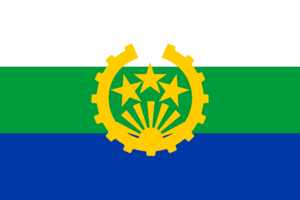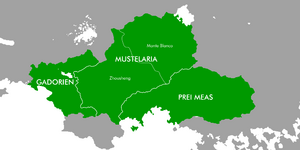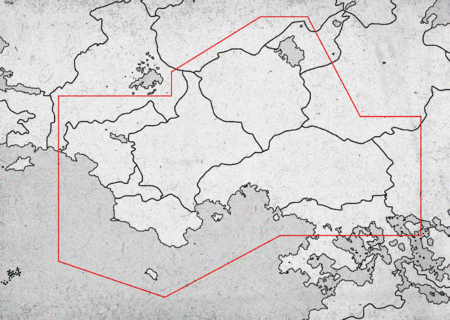Shanghou Pact: Difference between revisions
No edit summary |
No edit summary |
||
| Line 1: | Line 1: | ||
{{Infobox | {{Region icon Anteria}}{{NONCANON}}{{Infobox | ||
|title = {{collapsible list | |title = {{collapsible list | ||
|titlestyle=background:transparent;text-align:center | |titlestyle=background:transparent;text-align:center | ||
Latest revision as of 09:56, 11 September 2022
This text is non-canon because it was either retconned, the lore was changed, or the countries listed in this article no longer exist. Please comment on this article's talk page to share your input, comments and questions. Note: Linking this article might complicate your own worldbuilding. |
 Organization flag | |
 Location of the Union
| |
| Summary: | |
|---|---|
| Currency: | Sekinar (today) Former currencies:
|
| Established: | 3 March 1957 |
| Military HQ: | Pōr Ōntōra, Prei Meas[a] |
| Shanghou Commander: | Jan Чaŋriчna |
| Members: | |
| Official language: | |
| Minority languages: | |
| |
The Shanghou Pact, created as a result of a military alliance between Zhoushi Union (of Bogmia and Zhengia) and Gadorien after the War of the Council, including Monte Blanco as a next member in 1969 during the outbreak of the Preimeai civil war and Prei Meas itself after the civil war ended by involvement of the Shanghou Pact.
History of Shanghou missions
Although not officially existing as a military alliance, a unofficial link between Gadorien, Bogmia and Zhengia was formed during the War of the Council. After the defeat of the Council State in 1942, the two countries settled the boundary by exchanging multiple territories, which created multiple autonomies. During the next few years, Zhengia and Bogmia unified into Zhousheng and international trade became more and more important to both countries. Because of that, in 1957, Shanghou Pact was created as a military pact with economical side benefits between Zhousheng and Gadorien, having its first official military HQ in Tropponz, Grad Autonomy, Zhousheng.
The first country to join the newly formed allience was Monte Blanco, which, being threatened by an unstable situation on its southern border, decided to seek support by other countries with the same situation. With communists in Prei Meas winning one victory after another, Shanghou countries realized, that they have a hostile power on their shared boundary. In early 1970's, multiple military raids on Zhoushi-leased ports by communist forces lead to the enactment of the mutual defence clause. The retalitory strikes, followed by Shanghou Military intervention, obliterated forward defences of Preimeai communists, quickly pushing them behind the defendable perimeters and reinstating the Nokor. After the civil war ended, Prei Meas joined as a next member of the Shanghou Pact. Shortly after, the HQ was moved to Pōr Ōntōra, Phnom Autonomy, Prei Meas.
In late 1970's, Velharia tried to join on multiple occasions, claiming their position as reasonable on membership. Although having some reasonable arguments for their membership, Velharian regime was absolute monarchy autocratic, giving fear to the Shanghou politicians of possible dictatorial authoritarian precedent between other monarchist communities across the region (such as Krenya).
After Prei Meas joined the Purple Community, Shanghou countries decided to start talks on unification of the two organizations into one (which later came to be as the Sekidean Union). In 1989, representatives of the six countries (Gadorien, Zhousheng and Monte Blanco representing the Shanghou Pact, Canton River Delta and Great Golden Raj representing the Purple Community and Prei Meas acting as a mediator) and drafted a treaty based on combination of obligations form both Purple Community and Shanghou Pact that later came to be as the Sekidean Charter.
Although countries now being in the Sekidean Union, both organizations continued to maintain basic functions. The clause about reasonable threat, which was not included in the Sekidean Charter, was triggered by Prei Meas in 2006 at the outbreak of the Azure civil war, leading to SP countries taking a 100km wide stripe on the Azureden-Preimeai border, creaing a functional buffer zone between the chaos of the civil war and the Sekidean Union.
Although not officially, the Pact effectively ceased to exist in 2011 with the creation of the Inner Circle, which took over the functions of the Pact. To this day, every month, the rent on the miltary HQ base in Pōr Ōntōra is paid by the ISU fund, being maintained as one of backup headquarters for the Sekidean Armed Forces.
Treaty of the Shanghou River
Following text is a text signed by the countries joining the Shanghou Alliance, be it as a founder or as a new member:
Treaty of the Shanghou River
1. Countries signing the treaty are obligated to join defensive wars of other countries as far as they are in the dedicated area (via map inset)
2. Countries signing the treaty can demand their defense if they feel threatened
3. Countries agree to share partially-merged international politics
4. Countries agree to respect national minorities of other national countries
5. If there is a coup or a civil war in one of the countries, other countries are obligated not to join in support of the rebel forces
6. Common military practice is to be held at least once in a five year period

Map included in the accession agreement of Prei Meas into Shanghou
Those rules served as a base for the future creation of the Sekidean Charter.